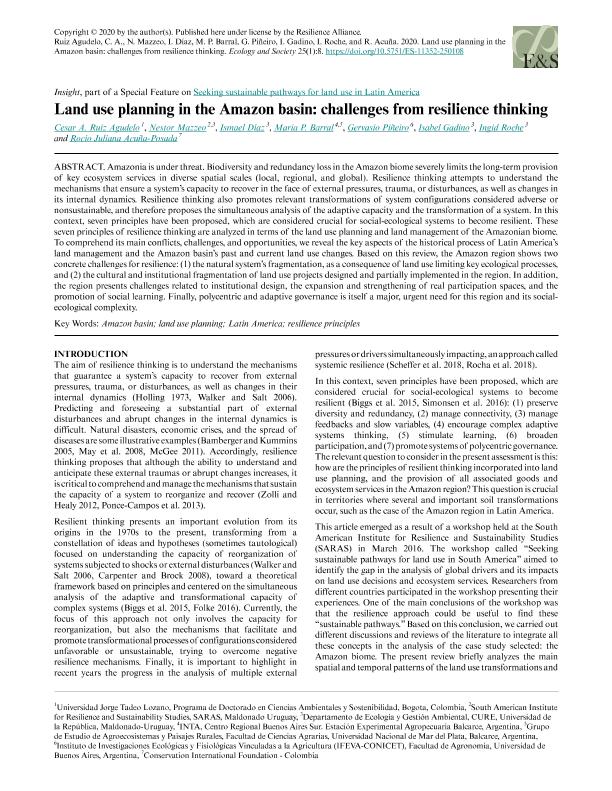Mostrar el registro sencillo del ítem
dc.contributor.author
Ruiz Agudelo, Cesar A.
dc.contributor.author
Mazzeo, Nestor
dc.contributor.author
Díaz, Ismael
dc.contributor.author
Barral, María Paula

dc.contributor.author
Piñeiro, Gervasio

dc.contributor.author
Gadino, Isabel
dc.contributor.author
Roche, Ingid
dc.contributor.author
Acuña Posada, Rocio Juliana
dc.date.available
2023-01-18T19:19:41Z
dc.date.issued
2020-03
dc.identifier.citation
Ruiz Agudelo, Cesar A.; Mazzeo, Nestor; Díaz, Ismael; Barral, María Paula; Piñeiro, Gervasio; et al.; Land use planning in the Amazon basin: Challenges from resilience thinking; Resilience Alliance; Ecology and Society; 25; 1; 3-2020; 1-18
dc.identifier.issn
1708-3087
dc.identifier.uri
http://hdl.handle.net/11336/184941
dc.description.abstract
Amazonia is under threat. Biodiversity and redundancy loss in the Amazon biome severely limits the long-term provision of key ecosystem services in diverse spatial scales (local, regional, and global). Resilience thinking attempts to understand the mechanisms that ensure a system’s capacity to recover in the face of external pressures, trauma, or disturbances, as well as changes in its internal dynamics. Resilience thinking also promotes relevant transformations of system configurations considered adverse or nonsustainable, and therefore proposes the simultaneous analysis of the adaptive capacity and the transformation of a system. In this context, seven principles have been proposed, which are considered crucial for social-ecological systems to become resilient. These seven principles of resilience thinking are analyzed in terms of the land use planning and land management of the Amazonian biome. To comprehend its main conflicts, challenges, and opportunities, we reveal the key aspects of the historical process of Latin America’s land management and the Amazon basin’s past and current land use changes. Based on this review, the Amazon region shows two concrete challenges for resilience: (1) the natural system’s fragmentation, as a consequence of land use limiting key ecological processes, and (2) the cultural and institutional fragmentation of land use projects designed and partially implemented in the region. In addition, the region presents challenges related to institutional design, the expansion and strengthening of real participation spaces, and the promotion of social learning. Finally, polycentric and adaptive governance is itself a major, urgent need for this region and its social-ecological complexity.
dc.format
application/pdf
dc.language.iso
eng
dc.publisher
Resilience Alliance

dc.rights
info:eu-repo/semantics/openAccess
dc.rights.uri
https://creativecommons.org/licenses/by/2.5/ar/
dc.subject
AMAZON BASIN
dc.subject
LAND USE PLANNING
dc.subject
LATIN AMERICA
dc.subject
RESILIENCE PRINCIPLES
dc.subject.classification
Otras Ciencias de la Tierra y relacionadas con el Medio Ambiente

dc.subject.classification
Ciencias de la Tierra y relacionadas con el Medio Ambiente

dc.subject.classification
CIENCIAS NATURALES Y EXACTAS

dc.title
Land use planning in the Amazon basin: Challenges from resilience thinking
dc.type
info:eu-repo/semantics/article
dc.type
info:ar-repo/semantics/artículo
dc.type
info:eu-repo/semantics/publishedVersion
dc.date.updated
2021-09-07T15:20:57Z
dc.journal.volume
25
dc.journal.number
1
dc.journal.pagination
1-18
dc.journal.pais
Estados Unidos

dc.description.fil
Fil: Ruiz Agudelo, Cesar A.. Universidad de Bogota Jorge Tadeo Lozano (utadeo);
dc.description.fil
Fil: Mazzeo, Nestor. Universidad de la Republica; Uruguay. South American Institute for Resilience and Sustainability Studies; Uruguay
dc.description.fil
Fil: Díaz, Ismael. Universidad de la Republica; Uruguay
dc.description.fil
Fil: Barral, María Paula. Consejo Nacional de Investigaciones Científicas y Técnicas; Argentina. Instituto Nacional de Tecnología Agropecuaria. Centro Regional Buenos Aires Sur. Estación Experimental Agropecuaria Balcarce; Argentina. Universidad Nacional de Mar del Plata. Facultad de Ciencias Agrarias; Argentina
dc.description.fil
Fil: Piñeiro, Gervasio. Consejo Nacional de Investigaciones Científicas y Técnicas. Oficina de Coordinación Administrativa Parque Centenario. Instituto de Investigaciones Fisiológicas y Ecológicas Vinculadas a la Agricultura. Universidad de Buenos Aires. Facultad de Agronomía. Instituto de Investigaciones Fisiológicas y Ecológicas Vinculadas a la Agricultura; Argentina
dc.description.fil
Fil: Gadino, Isabel. Universidad de la Republica; Uruguay
dc.description.fil
Fil: Roche, Ingid. Universidad de la Republica; Uruguay
dc.description.fil
Fil: Acuña Posada, Rocio Juliana. Conservation International Foundation; Colombia
dc.journal.title
Ecology and Society

dc.relation.alternativeid
info:eu-repo/semantics/altIdentifier/url/https://www.ecologyandsociety.org/vol25/iss1/art8/
dc.relation.alternativeid
info:eu-repo/semantics/altIdentifier/doi/http://dx.doi.org/10.5751/ES-11352-250108
Archivos asociados
